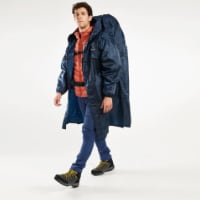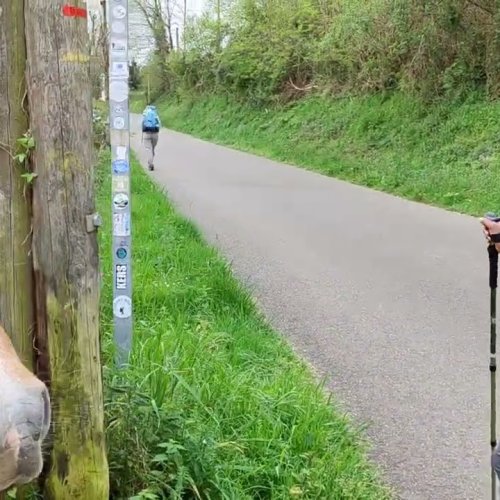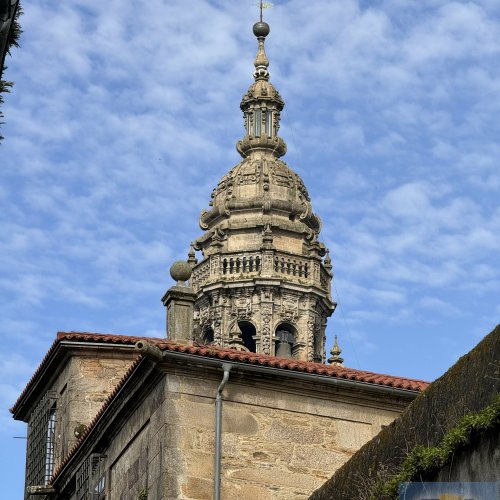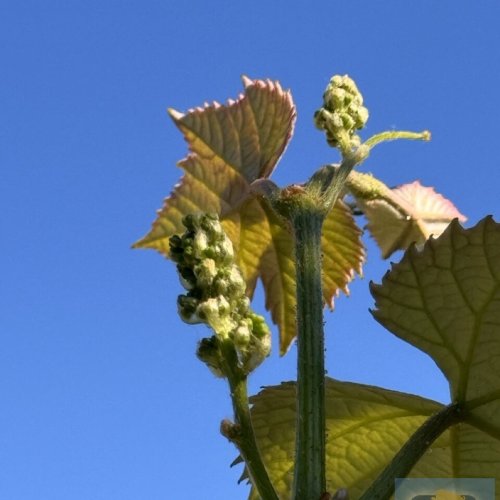-
For 2024 Pilgrims: €50,- donation = 1 year with no ads on the forum + 90% off any 2024 Guide. More here.
(Discount code sent to you by Private Message after your donation)
Search 69,459 Camino Questions
You are using an out of date browser. It may not display this or other websites correctly.
You should upgrade or use an alternative browser.
You should upgrade or use an alternative browser.
Very light, comfortable and compressible poncho. Specially designed for protection against water for any activity.
Our Atmospheric H30 poncho offers lightness and waterproofness. Easily compressible and made with our Waterproof fabric, its heat-sealed interior seams guarantee its waterproofness. Includes carrying bag.
€60,-
Our Atmospheric H30 poncho offers lightness and waterproofness. Easily compressible and made with our Waterproof fabric, its heat-sealed interior seams guarantee its waterproofness. Includes carrying bag.
€60,-
- Time of past OR future Camino
- Francés, Norte, Salvador, Primitivo, Portuguese
I don't think that you need a warm base layer, and certainly you don't need to pack special items just for the one or two days in the Pyrenees. You will need an outer layer for warmth such as a synthetic fleece or a lightweight puffer jacket.
There's a lot of posts on the forum extolling the virtues of merino wool, but it's definitely not the only choice, and the majority of pilgrims probably don't use it at all.
There's a lot of posts on the forum extolling the virtues of merino wool, but it's definitely not the only choice, and the majority of pilgrims probably don't use it at all.
- Time of past OR future Camino
- Most years since 2012
While I agree with @trecile that you don't need an official "base layer" just for that day or two in the famous Pyrenees, it depends on what other clothing you have and what your cold tolerance is. For April, I would take a "base layer" but I would expect to use it mainly as pyjamas. The pants would be available as a base layer for the daytime if really needed on the rare day or two. However, I would more likely pull on my rain pants as the extra layer on a chilly day as they are easier to take off if it warms up and my pyjamas can stay clean and dry for the evening. If you don't take rain pants, you can always layer whatever your two layers of pants are (I'm assuming you are going with two sets of lower body coverings.)
On a particularly cold day, you should plan to layer up almost all your clothing. Don't forget a warm hat, buff and gloves. These items are great because they are effective for warmth but are easy to don and doff as the weather changes.
On a particularly cold day, you should plan to layer up almost all your clothing. Don't forget a warm hat, buff and gloves. These items are great because they are effective for warmth but are easy to don and doff as the weather changes.
Ideal sleeping bag liner whether we want to add a thermal plus to our bag, or if we want to use it alone to sleep in shelters or hostels. Thanks to its mummy shape, it adapts perfectly to our body.
€46,-
€46,-
- Time of past OR future Camino
- CF (2000); St. Giles (2013); Le Puy-SJPP (2015); VDLP (2016); Mozárabe, Almeria to Granada (2018)
I don’t like the feel of wool on my skin and usually take a silk base layer. I have older ones from MEC but recently got a replacement from Lands End.
- Time of past OR future Camino
- Us:Camino Frances, 2015 Me:Catalan/Aragonese, 2019
You will find some suggestions at the following current thread (the name is a clickable link).
Any suggestions for a technical shirt with the performance of Merino but without the drawbacks?
Any suggestions for a technical shirt with the performance of Merino but without the drawbacks?
Last edited:
- Time of past OR future Camino
- March 2024 CF
I have the same wool allergy, turn into a lobster with merino. After much testing (200km+) have opted for Patagonia capilene products in various weights. They feel like cotton, dry fast and have anti microbial technology that is pretty good. Lined double layer synthetic-wool socks seem ok but have decided on some single layer synthetic socks out of Sweden. Carrying a fleece for warmth given we start in mid March on the CF through Valcarlos. Good luck with your search, wool allergies are a real pain.Me again!. I'm allergic to wool. Any suggestions for a warm base layer. We will be going over the Pyrenees mid April.
Jennifer
Down bag (90/10 duvet) of 700 fills with 180 g (6.34 ounces) of filling. Mummy-shaped structure, ideal when you are looking for lightness with great heating performance.
€149,-
€149,-
- Time of past OR future Camino
- Frances 2023, Norte (2024)
I suggest a long-sleeve half-zip running top. These come in varying weights and the lighter ones, REI and other stores carry them, would be good alternative. I took one w/ me in Sept., threw it on over tank top then when it got warm off it came, then back on when it cooled in the evening.
Rick Davidson
Member
- Time of past OR future Camino
- Francis, April/May (2019), Via Francigina May 2023
The base layer that you generally need is just a long sleeve light weight or midweight T-shirt…in your case probably 100% synthetic. This will be a durable, and moisture wicking base layer. I usually bring a short sleeve and a long sleeve and if I need some additional warmth I wear both. Every outdoor clothing brand makes this stuff. I usually first look at Patagonia. I almost never wear base layer bottoms when walking or hiking. When colder I add a lightweight fleece jacket or my rain/wind shell. All good for almost any weather conditions.Me again!. I'm allergic to wool. Any suggestions for a warm base layer. We will be going over the Pyrenees mid April.
Jennifer
- Time of past OR future Camino
- 2006 to date: Over 21 Caminos. See signature line
I have silk long johns and love them for base layer and sleeping
Very light, comfortable and compressible poncho. Specially designed for protection against water for any activity.
Our Atmospheric H30 poncho offers lightness and waterproofness. Easily compressible and made with our Waterproof fabric, its heat-sealed interior seams guarantee its waterproofness. Includes carrying bag.
€60,-
Our Atmospheric H30 poncho offers lightness and waterproofness. Easily compressible and made with our Waterproof fabric, its heat-sealed interior seams guarantee its waterproofness. Includes carrying bag.
€60,-
- Time of past OR future Camino
- Recent:Norte/Muxia- Spring '23
MadridWay- Fall '23
I unfortunately cannot tolerate wool either.
I layer similarly to @Rick Davidson, and have never had a problem with any of the synthetics I bring. I do sometimes add my puffy jacket if needed, especially on some of the colder, early spring mornings.
I layer similarly to @Rick Davidson, and have never had a problem with any of the synthetics I bring. I do sometimes add my puffy jacket if needed, especially on some of the colder, early spring mornings.
- Time of past OR future Camino
- Us:Camino Frances, 2015 Me:Catalan/Aragonese, 2019
Here's a Reddit question with lots of useful comments from women:I have silk long johns and love them for base layer and sleeping
Anyone use silk as a base layer?
"There’s a lot of love for merino wool but I’m curious if anyone uses silk as a base layer during the winter. Do you find it warm/durable/comfortable? Would you recommend it for someone who’s perpetually cold?"
- Time of past OR future Camino
- 2006 to date: Over 21 Caminos. See signature line
I read it.Here's a Reddit question with lots of useful comments from women:
I have had no problem with mine snagging - have used them for years.
They also do NOT stink like polyester will.
I find them durable - but then I generally wash them out by hand.
On Camino, I wear them over underpants, so only have to wash about once a week.
Join our full-service guided tour of the Basque Country and let us pamper you!
- Time of past OR future Camino
- Recent:Norte/Muxia- Spring '23
MadridWay- Fall '23
Annie, I own silk pajamas, but have never considered bringing them on the Camino as they are baggy and loose; designed for comfort. I can't envision myself using them as a base layer under other garments. When in albergues, I sleep in my clean clothes for the next day. In hotels I bring a very lightweight nightshirt. I am not understanding the idea of what makes silk pajamas so ideal.I read it.
I have had no problem with mine snagging - have used them for years.
They also do NOT stink like polyester will.
I find them durable - but then I generally wash them out by hand.
On Camino, I wear them over underpants, so only have to wash about once a week.
- Time of past OR future Camino
- Most years since 2012
I made black silk pyjama-style pants for myself specifically for the Camino! (I bought a beautiful piece of silk on sale about 30 years ago and was always waiting for the right inspiration for what to do with it. Also the type of silk makes a big different to how they look.) Normally I would never wear this style except in bed, since I am not tall, slim and elegant, and the nicest description of my style has been "urban utilitarian." However, on the Camino I am a different person! And full-length mirrors are not too plentiful in albergues (or I've managed to ignore them).I own silk pajamas, but have never considered bringing them on the Camino as they are baggy and loose; designed for comfort.
I go out to dinner on the Camino, imagining myself to be at the height of fashion while being super comfortable, and then I sleep in them. They wash and dry well, weigh 165g, have a warm feeling on the skin, and can easily be worn under my regular walking pants.
Maybe you should re-consider yours!
- Time of past OR future Camino
- CF (2000); St. Giles (2013); Le Puy-SJPP (2015); VDLP (2016); Mozárabe, Almeria to Granada (2018)
Hi Chrissy the silk tops and bottoms people use in a hiking context are a type of long underwear. They are close fitting and stretchy - same cut as other base layers. Surprisingly warm given how light they are.Annie, I own silk pajamas, but have never considered bringing them on the Camino as they are baggy and loose; designed for comfort. I can't envision myself using them as a base layer under other garments. When in albergues, I sleep in my clean clothes for the next day. In hotels I bring a very lightweight nightshirt. I am not understanding the idea of what makes silk pajamas so ideal.Do you wear a silk top, too, to eliminate odor. I do not struggle with being stinky to my knowledge.

Womens Silk Underwear | Lands' End
Shop womens underwear, silk at Lands' End. Shop underwear, silk, all products, womens.
Down bag (90/10 duvet) of 700 fills with 180 g (6.34 ounces) of filling. Mummy-shaped structure, ideal when you are looking for lightness with great heating performance.
€149,-
€149,-
While I agree with @trecile that you don't need an official "base layer" just for that day or two in the famous Pyrenees, it depends on what other clothing you have and what your cold tolerance is. For April, I would take a "base layer" but I would expect to use it mainly as pyjamas. The pants would be available as a base layer for the daytime if really needed on the rare day or two. However, I would more likely pull on my rain pants as the extra layer on a chilly day as they are easier to take off if it warms up and my pyjamas can stay clean and dry for the evening. If you don't take rain pants, you can always layer whatever your two layers of pants are (I'm assuming you are going with two sets of lower body coverings.)
On a particularly cold day, you should plan to layer up almost all your clothing. Don't forget a warm hat, buff and gloves. These items are great because they are effective for warmth but are easy to don and doff as the weather changes.
By base layer, I assume you mean tee shirt or do you mean thermal base layer?
There are many synthetic options for both - try to get something with polygiene though to avoid odour. Visit a few hiking or outdoor shops.
I walked in April this year (2023) and I wore my fleece gloves and a beanie a few times. I had a tee shirt, a very very thin lightweight thermal. I also carried a lightweight down jacket and a hiking rain jacket. Down jacket was for rest stops or early morning starts as you warm up while walking. The rain jacket for rain and wind protection (only needed twice but is an essential part of my kit).
There are many synthetic options for both - try to get something with polygiene though to avoid odour. Visit a few hiking or outdoor shops.
I walked in April this year (2023) and I wore my fleece gloves and a beanie a few times. I had a tee shirt, a very very thin lightweight thermal. I also carried a lightweight down jacket and a hiking rain jacket. Down jacket was for rest stops or early morning starts as you warm up while walking. The rain jacket for rain and wind protection (only needed twice but is an essential part of my kit).
- Time of past OR future Camino
- April 2024
With a wool sensitivity, you will do well by Patagonia capilene, since its longevity is amazing, and the moths will not damage them. I also have a wool sensitivity.Patagonia capilene products
Concur with Sep. I have used Patagonia capilene, from base to top layers, for over a quarter century for hiking, trail running, running 8-10 miles daily, long distance wilderness treks, wilderness backpacking, winter conditions kayaking, downhill skiing, road cycling, mountain biking, and visiting Europe in the winter. My various capilene tops lasted for over 25 years through lots of use and laundering. I donated some to the local rescue mission because I wanted different colors, and my favorites were a bit faded, though still functional in snow country. I still wear my capilene base layers, and they are my gotos.
I opted to buy this year a few merino wool tops from different manufacturers as well to see what the hype was about. They all felt itchy, so I wear one of my capilene base layers underneath. The merino wool is not as warm nor appealing as cashmere or the capilene, and imo less useful for a variety of sports. Still, they will likely keep you warm well enough if the Patagonia is too pricey.
€2,-/day will present your project to thousands of visitors each day. All interested in the Camino de Santiago.
- Time of past OR future Camino
- First one in 2005 from Moissac, France.
Hi, I agree with most of the above. If you are sensitive to wool then other options are available - personally I would stay away from anything synthetic, regardless of what the adverts say it is still essentially wrapping the body in a form of plastic - and oh my, how you and it stink!
Early Everest mountain climbers used silk as their base layer and it is still probably the best as it is effective but also very light and packs down small. (My choice? I wear cotton next to my skin).
I went over from St Jean in early April, back in 2005. The pass was open, no snow at low levels and a clear bright sunny day, but weather can drastically change in moments on a mountain and as I went higher a heavy blizzard blew in. The snow was very deep, almost to the top of the trail markers, visibility was low - no way of going back and no way of stopping so I found a windbreak and put on every bit of clothing in my pack and carried on and the storm passed as I descended. I found it rather exhilarating but never felt the need for a specific base layer. I think I would have become too sweaty .. the walking is strenuous so you generate a lot of heat so it seems to me that as long as you are moving then standard layering and a fully windproof outer do the job.
Though I failed on that - Altus poncho! (yes, I was an idiot).
Early Everest mountain climbers used silk as their base layer and it is still probably the best as it is effective but also very light and packs down small. (My choice? I wear cotton next to my skin).
I went over from St Jean in early April, back in 2005. The pass was open, no snow at low levels and a clear bright sunny day, but weather can drastically change in moments on a mountain and as I went higher a heavy blizzard blew in. The snow was very deep, almost to the top of the trail markers, visibility was low - no way of going back and no way of stopping so I found a windbreak and put on every bit of clothing in my pack and carried on and the storm passed as I descended. I found it rather exhilarating but never felt the need for a specific base layer. I think I would have become too sweaty .. the walking is strenuous so you generate a lot of heat so it seems to me that as long as you are moving then standard layering and a fully windproof outer do the job.
Though I failed on that - Altus poncho! (yes, I was an idiot).
Last edited:
That experience sounds like quite an adventure.Hi, I agree with most of the above. If you are sensitive to wool then other options are available - personally I would stay away from anything synthetic, regardless of what the adverts say it is still essentially wrapping the body in a form of plastic - and oh my, how you and it stink!
Early Everest mountain climbers used silk as their base layer and it is still probably the best as it is effective but also very light and packs down small. (My choice? I wear cotton next to my skin).
I went over from St Jean in early April, back in 2005. The pass was open, no snow at low levels and a clear bright sunny day, but weather can drastically change in moments on a mountain and as I went higher a heavy blizzard blew in. The snow was very deep, almost to the top of the trail markers, visibility was low - no way of going back and no way of stopping so I found a windbreak and put on every bit of clothing in my pack and carried on and the storm passed as I descended. I found it rather exhilarating but never felt the need for a specific base layer. I think I would have become too sweaty .. the walking is strenuous so you generate a lot of heat so it seems to me that as long as you are moving then standard layering and a fully windproof outer do the job.
Though I failed on that - Altus poncho! (yes, I was an idiot).
For an easy trail like the Frances, which is mostly quite close to civilisation/phone reception the base layer composition probably doesn’t matter as much in most cases. But, for any serious ‘back country’ hiking, cotton isn’t the best choice next to skin in cold weather. This is because it doesn’t wick sweat away from the skin or (more importantly) help your body retain heat when wet like polypropylene, fleece, or wool etc does.
There are jersey silk base layers.
They are great.
If your sesitivity for wool is not an absolute obstacle for wearing any Wool, I recommend half silk half merino wool base layer. The silk makes the fabric non-scratchy and very soothing.
These fabrics stay fresh and do not require washing as often as synthetics.
Silk base layer
 www.timarco.com
Silk-merinowool base layer
www.timarco.com
Silk-merinowool base layer
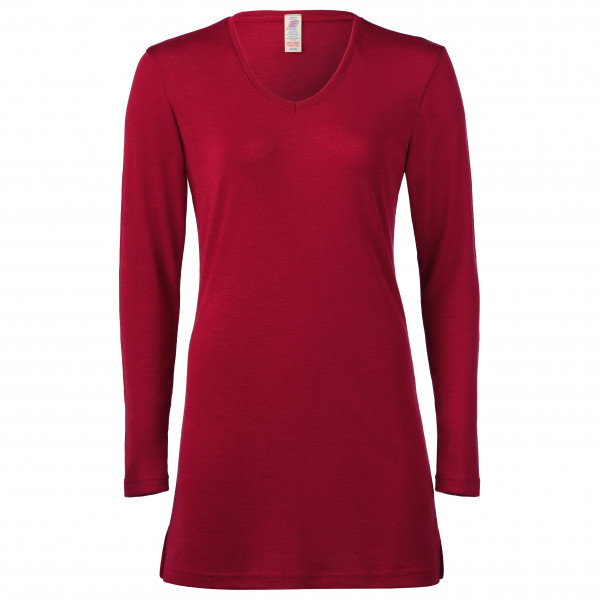
 www.bergfreunde.eu
www.bergfreunde.eu
They are great.
If your sesitivity for wool is not an absolute obstacle for wearing any Wool, I recommend half silk half merino wool base layer. The silk makes the fabric non-scratchy and very soothing.
These fabrics stay fresh and do not require washing as often as synthetics.
Silk base layer
Damella Silk Long Sleeve - Paidat - Vaatteet - Timarco.fi
Osta DAMELLA SILK LONG SLEEVE Timarcolla, suuri valikoima ja todella hyvät hinnat. Netissä vuodesta 1997. ✓Ilmainen kuljetus ✓Turvallinen E-Kauppa ✓Nopea toimitus

Engel Longshirt - Merino base layer Women's | Free EU Delivery | Bergfreunde.eu
Engel - Women's Longshirt - Merino base layer ➽ Dispatch within 24h - Buy online now! ✓ 100 Day Return Policy ✓ Expert advice ✓ Free delivery to EU countries
 www.bergfreunde.eu
www.bergfreunde.eu
The one from Galicia (the round) and the one from Castilla & Leon. Individually numbered and made by the same people that make the ones you see on your walk.
- Time of past OR future Camino
- March 2024 CF
I am continually amazed by the longevity of better quality hiking products like those made by Patagonia. Similar to SilentNight I am still trying wear out my first of their products I purchased twenty years ago but I am wearing out faster than they are. I just finished about 200km of testing three capilene shirts with the HEIQ antimicrobial against another untreated name brand base layer. Simply no comparison- the untreated shirt is definitely not a lot of fun after about three hours of walking. I can comfortably get a few days use out of treated shirts between washings if I need to. Pleased to say my family didn't kick me out of the house when I attempted this experiment so I am confident in the result. If you want to dig a little deeper, go to the HEIQ website that gives a little background on these silver-based antimcrobial materials. Various companies embed silver-based antimicrobials in everything from clothing to hospital surfaces and even specialty steel. From what I can read Patagonia switched over to HEIQ a while ago from another Swedish antimicrobial company. In summary it appears to be quite well-established science.With a wool sensitivity, you will do well by Patagonia capilene, since its longevity is amazing, and the moths will not damage them. I also have a wool sensitivity.
Concur with Sep. I have used Patagonia capilene, from base to top layers, for over a quarter century for hiking, trail running, running 8-10 miles daily, long distance wilderness treks, wilderness backpacking, winter conditions kayaking, downhill skiing, road cycling, mountain biking, and visiting Europe in the winter. My various capilene tops lasted for over 25 years through lots of use and laundering. I donated some to the local rescue mission because I wanted different colors, and my favorites were a bit faded, though still functional in snow country. I still wear my capilene base layers, and they are my gotos.
I opted to buy this year a few merino wool tops from different manufacturers as well to see what the hype was about. They all felt itchy, so I wear one of my capilene base layers underneath. The merino wool is not as warm nor appealing as cashmere or the capilene, and imo less useful for a variety of sports. Still, they will likely keep you warm well enough if the Patagonia is too pricey.
Most read last week in this forum
I realize every ounce matters when carrying backpack and not shipping luggage ahead. However,
I know that the Spaniards are big into meat and potatoes, and not so much produce. I am thinking of...
Hola,
I gearing up to start my 1st CdS and have seen people recommended sleeping bag liners to protect against bed bugs.
Do these help or is it a myth?
Should I add the extra weight of bringing one?
So I have heard common wisdom is to bring a silk liner for your Camino (+/- a sleeping bag depending on your preference and season).
Specifically regarding silk liners, all of the ones I've...
Hi! I am 15 days out from my Camino, and suddenly my Buen Camino app is crashing every time I try to look at my stages! I have rebooted my phone, done the "restore app" within the app, rebooted...
Similar threads
❓How to ask a question
How to post a new question on the Camino Forum.
Similar threads
Most downloaded Resources
-
“All” Albergues on the Camino Frances in one pdf“All” Albergues on the Camino Frances in one pdf
- ivar
- Updated:
-
A selection of favorite albergues on the Camino FrancésFavorite Albergues along the Camino Frances
- Ton van Tilburg
- Updated:
-
Profile maps of all 34 stages of the Camino FrancesProfile maps of all 34 stages of the Camino Frances
- ivar
- Updated:


